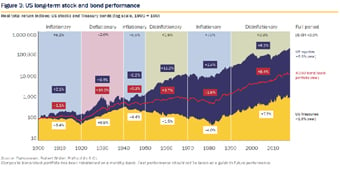Wealth Management: Market Perspective – When markets disappoint: Markets don’t have to deliver

Market timing is really difficult - clearly - and if we try to fine tune our advice now we may find ourselves stranded out of the market if/when it rebounds. We think long-term inflation-beating returns are still available.
They do not have to be. There is no law of markets that says they must do what we want them to - that is, preserve and grow real wealth on a long-term view. Historically, there have been quite lengthy periods when they haven't.
Click the image to enlarge
Figure 3 summarises the last century or so of US stock and bond returns. The UK experience (not shown) is remarkably similar (continuous data for other big markets are harder to get).
There have been three decades in which a 60:40 mix of stocks and bonds - a typical 'balanced' portfolio these days - failed to deliver an inflation-beating outcome, and a fourth in which it was marginal: the 1910s, 1940s and 1970s, with the 1960s as the marginal one. There was almost half a century in which it did little more than match inflation, between 1936 and 1981.
On closer inspection, the immediate driver of the poor returns was the government bond market. In each of those decades, bond returns fell below inflation, while in three of them - the 1970s being the exception - real stock returns remained positive.
What those periods have in common, at the risk of oversimplification, is that inflation itself was relatively high in each of them. In three of the four, the inflation was associated with war, and 'too much money chasing too few goods', but in the 1970s, there was a bigger 'cost push' component thanks to OPEC and poor industrial relations.
The fact that the UK's inflation experience was similar - if anything, it was more disruptive, and in the 1970s, UK stocks struggled more than both gilts and US stocks - suggests that there was some common causality at work.
Given the recent obsession with deflation risk, it is worth noting that the only deflationary episode here - the 1920s and 1930s - saw both US and UK balanced portfolios, and both stocks and bonds, delivering firmly positive real returns. This is despite these decades including the 1929 crash and the subsequent Great Depression.
On reflection, this makes sense. Most bond coupons and principals are fixed in nominal terms, and their real worth is especially vulnerable to prolonged inflation. Stocks are not immune, but are arguably a sort of real asset themselves - small portions of real businesses.
The reason US and UK stocks also did badly in the especially inflationary 1970s is that businesses then were also doing badly (profitability was poor, partly because of the cost-push inflation).
Real stock returns were also poor (in the UK as well as the US) in the 2000s, even though inflation was low and bonds performed well - but this followed the extreme overvaluations seen in the dotcom episode.
…but we think they can
This is why we are often focused on inflation. The bigger it is, the harder it is to beat. It has been associated with poor investment returns - usually from bonds, but also, when disruptive enough, from stocks too.
Even at today's modest levels of inflation, the prospective real returns on most bonds are negligible or (in Europe) negative. But they seem unlikely to be as weak as in the decades identified here. And unless inflation becomes much more disruptive - by pushing interest rates up dramatically, and/or by hitting growth - it seems unlikely to hurt stock returns. At today's valuations, and with trend economic growth rates in mind, stock returns can outpace inflation into the longer term - on average, if not necessarily every year.
Investment conclusions
Our top-down views are unchanged. Our portfolio managers hold some specific protection in anticipation of volatile stock markets, but a more defensive restructuring could leave us stranded if markets rally. A big surge in inflation, and/or a recessionary drop in profits, does not seem imminent, geopolitical risks are manageable, and stock valuations are now close to trend. Stocks can still deliver inflation-beating long-term returns.
- We continue to view most bonds and cash as portfolio insurance, not as a likely source of real investment return.
- Most government bond markets look expensive. US yields rose markedly, but have now fallen back a little and again offer little compensation for inflation and duration risk. Elsewhere, most developed market nominal yields remain firmly below likely inflation rates.
- Our preference for high-quality corporate bonds to government bonds is fading, even after their recent weakness. Their additional yield is not compelling, especially at this stage in the cycle, when corporate default risk is rising, The room for outperformance is most reduced in the eurozone, where valuations have been highest, the European Central Bank's buying is about to cease and local credit concerns pose some limited risk to banks, but it is also shrinking in the US.
- We continue to prefer relatively low-duration bonds in the eurozone and UK, and are more neutral in the US, where we also still see some attraction in inflation-indexed bonds. Speculative grade credit has cheapened further, but still offers little headroom in our opinion - net of default and loss, European returns may struggle to match inflation. We see little appeal in emerging market bonds for multi-asset portfolios, even after their recent sell-off.
- We still prefer stocks to bonds in most places, even the UK (where the big indices are really global in nature). We have few regional convictions, but still believe emerging Asia's structural appeal remains intact, trade tensions and volatility notwithstanding. We continue to favour a mix of cyclical and secular growth over more defensive bond-like sectors.
- Trading currencies does not systematically add value, and there are currently few big misalignments among the majors. With risk appetite low, the Swiss franc may continue to stay stronger for longer than we'd thought. Our wariness has shifted instead to the euro - growth and interest rate carry are low, medium-term political uncertainty has risen, and it is not cheap. Cyclical momentum and interest rate carry clearly favour the dollar, which is also often seen as a safe-haven currency - it is expensive, but not especially so. The pound remains hostage to Brexit tensions, but is competitive. The yen also looks competitive, but its monetary policy remains the loosest. China's monetary policy has loosened of late, and the yuan has fallen back towards trend, but on a very long-term purchasing power parity basis, it remains the most obviously undervalued currency. Overall, we have a small preference for the dollar, and are least keen on the euro.
Click here to continue: Market Perspective- When markets disappoint>
In this Market Perspective:
-
Foreword
-
When markets disappoint
-
Markets don't have to deliver… (current page)
-
Economy and markets: background
-
Important information
Download the full Market Perspective in PDF format (1.04 MB)
